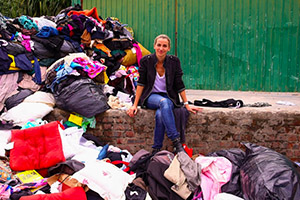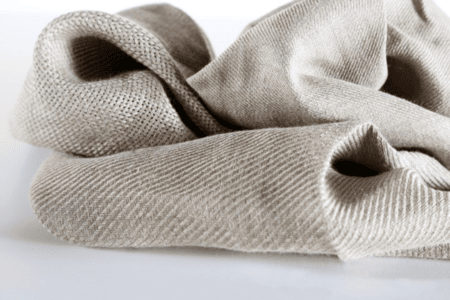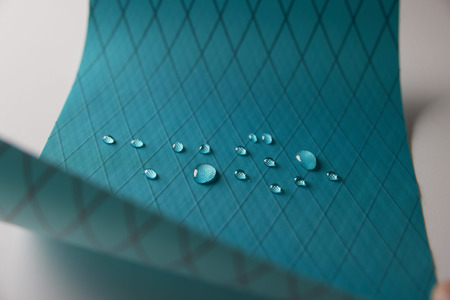
Saving High-End Waste Materials From Landfill
YarnsandFibers News Bureau 2019-06-10 15:00:00 – United StatesThe R Collective is a clothing brand using some of the industry’s highest quality materials, but with a difference: it rescues excess materials from world-leading luxury designers, and upcycles them to create something entirely new.
British entrepreneur Christina Dean founded the company in 2017, inspired by a charity she founded in 2007 called Redress, which works to reduce fashion waste and promote a circular fashion industry.
With 12 years of experience in tackling the industry’s waste problem and driven by the urgent environmental crisis caused by fashion, Dean didn’t want to just “start a fashion brandâ€.
“We wanted to use business as a tool to transform fashion,†she said. “We first-hand witnessed enormous amounts of quality textile waste – the industry is estimated to generate 92 million tons of textile waste every year. Meanwhile, we are sitting right in the middle of the fastest growing consumer markets in Asia, particularly in China.
“The reality is that the world has enough clothes – and we don’t need to make or buy any more. But fashion is not rational; it pulls and provokes and is here to stay. That’s why we took the realistic and pragmatic view that consumers will continue shopping for clothes and that ‘new’ fashion production is here to stay.â€
With The R Collective, Dean aimed to win over conventional fashion consumers and convert them into sustainable fashion consumers.
“Every consumer we win means we are reducing waste whilst slowing down of virgin fabric production, whilst catalysing a circular fashion economy.â€
Dean’s company targets consumers in China, Hong Kong and the UK, and their office in Hong Kong is “strategically based†to capture the world’s fastest-growing fashion consumer markets: in Asia. Boston Consulting Group’s 2019 Pulse Report found that 75% of consumers surveyed view sustainability as extremely or very important. J. Walter Thompson’s 2019 “The New Sustainability Regeneration†survey claims that 79% of respondents confirmed they would like more information on the sustainability credentials of the clothing brands they buy.
Not only does Dean ensure an alternative to fast fashion, but she also provides fashion brands with a sustainable waste management solution. The R Collective partners with luxury fashion labels, giving them a route for their excess materials that doesn’t include incineration, landfill or down-cycling into the rag trade.
Every year, the company creates two collections of essential wardrobe pieces, and four capsules, in collaboration with sustainable designers from around the world.
A multitude of factors including changing consumer preferences in terms of what, how and where they purchase means the fashion industry is constantly in a “state of flux†as Dean puts it.
“Within this myriad of complex factors, which even the upper echelons of business grapple with, lies opportunity. Fashion upstarts, with creativity at their core and agile businesses with access to the new wave of social impact investment, are in a good position to win.
“Over the last 12 years, I’ve witnessed the sustainable fashion market evolve, with consumers around the world, particularly Millennials and Gen Z, claiming much more appetite for sustainable fashion and higher expectations for responsible business.â€
“Our business is different because we are led by our mission to reduce waste,†said Dean. “This means the design process starts with what we rescue, requiring different design approaches and creativity and problem-solving. It also means we must be nimble and smart to capture the best fabrics, in partnership with brands and mills.â€
The R Collective doesn’t buy textiles. “There is already a well-developed market for trading in excess fabrics and we are not competing within this pre-existing market.
“Instead, we rescue fabrics that have not, for many reasons, been commercialized by their current owners and which may be on their way to landfill/incineration. So we’re really at the very end of the line for fabrics, which is critical for us as these are often the hardest fabric to rescue.â€
All the materials the company uses are donated, meaning the cost of goods is lower than most of the company’s competitors.
“We invest funds in rescuing fabrics, which is an arduous process, and we streamline our logistics with our waste partners, including with charity Redress, who have a textile bank in Hong Kong for different waste streams. This means that collectively, we have access to unique waste materials.â€
The R Collective’s main challenges are constantly needing to adapt design and creativity to be able to use the varying colors, types and amounts of fabrics available.
“We’ve had to stabilize our supply chain, based on a unique and challenging sourcing strategy, which we’ve succeeded in doing through the right production partners.â€
One of The R Collective’s partners includes TAL Group, which makes one in six of all the shirts in the US market.
The company currently sells 70% to wholesalers, and 30% direct to customers.
In the future, Dean hopes to own 0.1% of the sustainable fashion market by 2023, as well as creating a “healthy fundraising pipeline†for her Redress charity; the company donates 25% of its profits to the charity.
“My goal is to catalyze a circular fashion revolution, transform the way in which fashion is designed, produced and consumed, and prove that an ethical and sustainable fashion business can be profitable for investors.â€
Courtesy: Forbes
Market Intelligence
Ask for free sample Report

experience
Customer Base
dedicated team
Countries Served Worldwide









